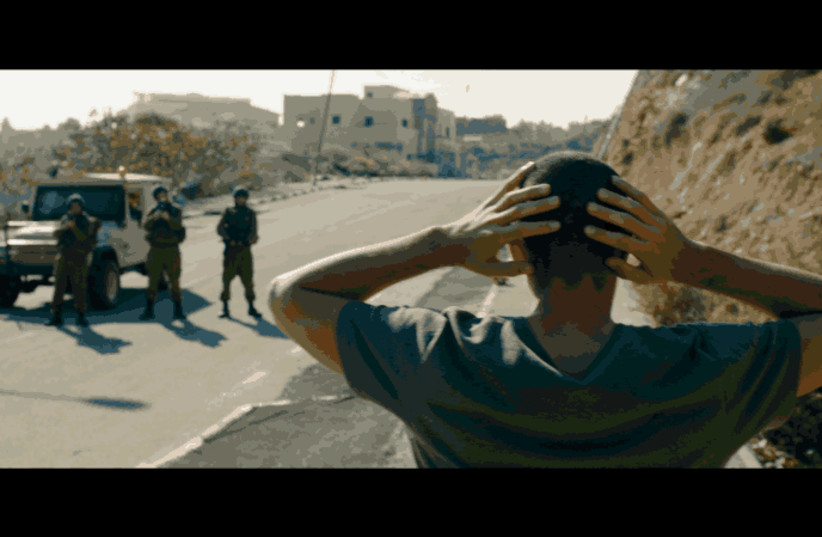When Netflix announced its group of films called Palestinian Stories, they invited subscribers to “discover all the greatness of Palestinian cinema with this heartfelt, humorous and captivating collection that features award-winning films and filmmakers.”
I had already seen one of the films included in the collection: The Present. Filled with lies, it was clearly just a vehicle for anti-Israel propaganda and I critiqued the film in depth. Therefore I turned to Facebook friends, seeking alternatives to Netflix. They provided a variety of suggestions.
Yet I still am resistant to switch. For one reason only. Netflix brings movies from around the world, made by them and from within their own cultural and societal realities, not movies made about them by others, as we might find in Hollywood. American movies with Asian themes, for instance, are always in relation to the United States – either Asian immigrants and their experiences in America or Americans and their experiences in Asia.
On Netflix we find movies that are like opening a window into their own societies as told by them for themselves. I am enjoying films from Lebanon (and there is no anti-Israeli tone in them, even when dealing with war, such as Under the Bombs), from Korea (I love their detective films), a legal series from Abu Dhabi, and more. And herein lies the big difference between films from other countries and this set of films from the Palestinian Authority.
It is as if nothing else concerns the PA population other than “the occupation.” Every problem they have is seen through the lens of “the occupation.” The brief descriptions of these films show this. For example, for Salt of this Sea:
“A Palestinian American woman travels to her homeland to retrieve her grandfather’s savings, which had been frozen since his exile during the Nakba.”
The word “Nakba” is a loaded term referring to the displacement of about 700,000 Arabs from the State of Israel during the War of Independence. Of course that was a catastrophe for those involved, but the term is one that seeks to delegitimize Israel. The displacement and murder of millions of Syrians is also a catastrophe, but the word Nakba is not used to refer to this ongoing tragedy, for example. Is Netflix going to make a series titled “Syrian Stories”?
Not likely.

Looking over its selection of films, we find that the series mostly deals with issues of detention and imprisonment in Israel, the checkpoints, and examining the effects of exile, loss and trauma. As if writing about the lives of individuals and families that are unrelated to “the occupation” is impossible. As if “the occupation” is the cause of all evils in the Palestinian Authority. In fact, this mirrors academic articles that examine a whole myriad of problems faced by those living under the PA whereby heart attacks and other medical problems are caused by “the occupation,” university studies are hindered by “the occupation,” and more.
It is natural that films made in the PA will deal with themes of war, checkpoints, displacement and trauma. But when the overwhelming bulk of their films do this, we cannot help but come to the conclusion that the only thing filmmakers in the PA consider film-worthy are these topics.
An interesting exception, I thought, is the 14-minute film Ave Maria, and I anticipated being able to write that this one, indeed, was different. It is about what happens when a car carrying a Jewish couple living in Judea and Samaria and the husband’s mother get into an accident at the entrance to a convent housing five nuns who are under an oath of silence. Labeled a comedy, this film could have gone in any number of directions but what it is, in fact, is a platform for demonstrating the ugly Jewish settler.
All the actors are Israeli-Arabs except for two Jewish women who play Jews, yet they categorize this as a “Palestinian” film. One of the stars avoids referring to herself as Israeli by calling herself a Jerusalemite. Aside from showing how despicable the Jews are, it also demonstrates no understanding of Shabbat, something Arabs having grown up in Israel should not get so wrong. It was painful to watch.
May Odeh, director of The Crossing, is quoted on the Netflix website as exclaiming that “we all in the Palestinian film industry have been eager to share our narrative with the world through our authentic creative productions as an alternative to news reporting.”
And there we have it! They are not interested in making films that simply dramatize various aspects of their lives but, rather, that continue to convince the world of the validity of their “narrative.”
All art is produced by people who have biases – and we all have biases – but these “Palestinian Stories” take the bias further and anticipate that the naïve viewer will accept these fictions as an alternative to news reporting or, let me add, as a booster shot to biased anti-Israeli news reporting rampant in the media.
Do I have to miss all the other international offerings on Netflix that I appreciate in order to protest the use of its platform for demonizing my country?
The writer is a retired family and trauma therapist. In Israel for over 45 years, she is currently exploring mutual interactions between politics and Israeli society.
